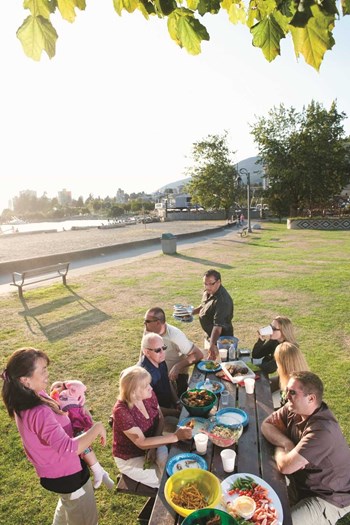
Social activities offer an opportunity to improve relationships within the community and add a far more convivial atmosphere to condo properties—something many prospective owners anticipate in a new location.
Sponsoring leisure time activities in any season builds lasting strains of creative interaction, teamwork and commitment within the community. That being said, such support does not come without cost. Boards must consider both the costs of socializing and the potential insurance or legal hit that could follow a mishap. (We’ll explore that later.)
Opportunities to mix and mingle may help ease friction when problems occur down the road, property managers say.
Justin Gargiulo is senior vice president and director of corporate operations at Great North Property Management in Exeter, New Hampshire. The company manages more than 200 condominium associations with 13,000 units in New England. He considers socializing a win-win proposition, noting that event planners—often resident and staff volunteers—have an important role, superceding “fun.”
“When you have, in many cases, hundreds of residents living in a community, it’s a positive way to bring everyone together and allow them the opportunity to discuss things outside of the normal condominium or HOA living issues that arise during a normal meeting,” said Gargiulo. “It also allows our property managers the opportunity to interact on a more personal level with our resident clients, which again enhances our relationship—which is ultimately what we want with our associations. This is as much a ‘people’ business as it is managing real estate assets. You cannot be successful in this business without being cognizant of this fact.”
Jeffrey Robinson is an association manager at Evergreen Management, Inc., headquartered in Bedford, New Hampsire, with 8,500 units in Massachusetts and the Granite State. “Ideas mainly come from homeowners within the community,” he said. “Oftentimes, if the suggestion is approved by the board, the homeowner who proposed the event will become the committee chair for organizing it.” He’s noticed an increase in such activities, perhaps because they offer less costly entertainment.
The activities they plan depend much upon residential makeup, managers say.
“These events typically start out as ‘BYOE’ events (Bring Your Own Everything), and are held at an association amenity—a clubhouse, pool, tennis courts, or open field,” Robinson said. “If and when the event becomes larger, with high attendance, it can become a line item in the budget, and the association will pay a portion of the expenses. For smaller events, such as a book club, the association will often donate the use of their clubhouse with no rental fees. For the most part, homeowners appreciate the community events. People in general like to get to know their neighbors and these community events present the opportunity to do so.”
Costs aren’t usually on residents’ backs. Management budgeting may include these events; some boards approve a line item for social gatherings. “It depends again on the association, as to whether or not they want to budget for it,” said Gargiulo. “I’d recommend getting an opinion of the overall community. Residents may feel it’s not a part of the overall management of the common area of the property, and outside of the typical scope of what their association dues are for. Getting a majority of owners to buy into the idea would be my recommendation to an association board. The alternative solution would be to take donations from members—which, in many cases, can be successful. Hearing what the people of the community want is the best place to start, though.”
Managers agree affluence and age have an impact. Some of the most enthusiastic partiers are among the 55+ condominium communities, where activities may include cultural events, book clubs or wine-and-cheese gatherings.
“Overall turnout depends on many things, like the demographics of a community, the layout of the community (whether there’s a clubhouse or not), and the type of events scheduled,” said Gargiulo. “Are they geared toward adults, or are family events planned, with things for kids to do? If a social committee balances the types of events they’re offering, they can be very successful over time in enhancing the overall living experience at their respective association.”
David J. Levy, president of Sterling Services, a management company in Holliston, Massachusetts, which oversees 3,000 units, agrees that older, upscale communities initiate activities more quickly, even independently. “They have a stronger sense of community,” Levy said. “I’m not sure if it’s the chicken or the egg, but people who are social may select a property with a clubhouse.” Having a clubhouse tends to encourage more socialization.
He advises managers to create a social budget. “Not every board wants that kind of activity, but try to budget $2,500 for social activities. Where everyone is fighting about the budget, the treasurer might say ‘Let’s cut it.’ As an owner, I’ll say, ‘I’ll pay for it myself.’ I believe there’s a value; the sense of community is worth it. So if you are cutting back, cut back on what you’re serving — but have the event.”
Despite the lethargic economy of recent years, 50 to 60 percent of his company’s communities sponsor events. “In one area, joining together eight properties, we do a joint social,” Levy said. Cost of this annual event is allocated according to the size population each property represents. “We also go to vendors for contributions,” he said. They are the people who provide maintenance, repair or construction services, etc., to the community. We raise a lot of the cost that way.”
Variety is the spice of life. “We’ve had catered events, magicians, an ice cream truck, barbecue cooking, bands, kiddie events,” Levy said. Few management firms take it to the extent he does, though. After a rented clown’s off-color jokes riled some mothers, Levy donned a clown costume for the event.
“I turned to my youngest daughter and said, ‘I know how to juggle; we need costumes.’ My daughter escorted me to an iParty store and we purchased the whole shebang: big, floppy feet, gloves and wig, outfit and happy face makeup.”
He often helps set up tents and tables in the morning, returning later as a clown. He’ll juggle two balls and eat an apple at the same time, or teach kids to juggle. Sometimes, he brings extra garb, so children can also clown around.
This has a serious purpose, Levy says. “It’s the concept of trying to be part of a team. We want to teach the trustees to move beyond facility management. In some places, we are primarily a negative force in their lives in everyday life, but here they see us instead in a social role, a serving role, and that builds more connection with them. It makes other things easier to accomplish. People understand we’re not just a corporation, and they’re not just numbers. It’s worth the effort.” In locations where there’s a multi-lingual, multi-cultural residential mix, these activities tend to cross barriers and ease relationships.
There are a few pitfalls to beware of, Levy says – led by the time constraints of the condo manager. To add a social obligation a Saturday, several times over summer, is an extra constraint on their lives.
Then, he notes, there is fiscal pressure. “Some board members will say, we’re raising the fee 10 bucks this year, and we should cut social. They don’t see the value in it.”
And there’s the allure of giving in. “Managers dislike conflict. They’re more likely to cave if somebody pushes back. A strong-willed trustee convinces them to cancel the party. It takes a lot of energy … but once it’s going, it’s easier.”
A Few Words of Caution
Attorney Frank Flynn says, jokingly serious, that if boards listen to an attorney, they probably won’t sponsor anything. Most boards, however, weigh the negatives against the positives and lean, somewhat wiser, in the direction of social events. Forewarned, they hopefully will not engage in anything that ends up in an expensive court wrangle.
Flynn, a managing partner with the Boston law firm of Downing & Flynn,which represents condo associations and rental property managers in Massachusetts and Rhode Island, says liability is the big threat. “The number one danger is social host liability. In Massachusetts, and other states, when anybody has an event and serves alcohol, if they serve too much—and a person drives and perhaps kills somebody, they could be liable,” he says.
“Let’s say it’s a Super Bowl party. Commonly, alcohol is served at parties like that. If the board is hosting the party, it may well be held liable after a tragedy. Even if the board hires a vendor or a bartender—and that may be a good option if one is providing alcohol—there may be an assumed liability. In defending cases like that, the personal injury attorney will sue everybody they can—the board, the caterer that brought the bartender in, the place where the event was held.”
Serving alcohol is probably not the best idea, Flynn says. Consider it carefully, and talk with the insurer.
He advises keeping a careful eye on what’s being consumed and getting event insurance.
Robinson concurs. “The biggest concern with any community event is the association’s exposure to liability. The association/committee should not purchase or serve alcohol for any event; additionally, the board or committee should not advertise any events as permitting alcohol. While it may seem like overkill, we oftentimes will recommend that they hire a police officer when alcohol is permitted. The presence of a police officer will strengthen the association’s position in the event of an accident and subsequent liability claim.”
Plan carefully. “The committee should work with the board and management company in risk management, to minimize the possibility of an accident and subsequent liability claim,” Robinson said. “The group should take the time to identify the potential risks, and put together and implement a plan to eliminate or minimize the risks.”
Jeff Grosser at Rodman Insurance Agency in Needham, Massachusetts, advises double checking the policy. “An association’s general liability coverage affords protection for the association against claims of third party bodily injury and property damage resulting from the operation of the premises—including social activities. If alcohol is being served (assuming there is no charge) then many policies provide some coverage for Host Liquor Liability.”
Don’t assume anything, he says—check the insurer regarding coverage and implement controls, such as a police detail, to avoid claims.
Ultimately, events are another way to reach out to residents. “We’re much more cloistered now,” Levy says, “so we try to bring that sense of community we used to have in the ‘40s and ‘50s.”
Anne Connery Frantz is a freelance writer and a frequent contributor to New England Condominium.






Leave a Comment